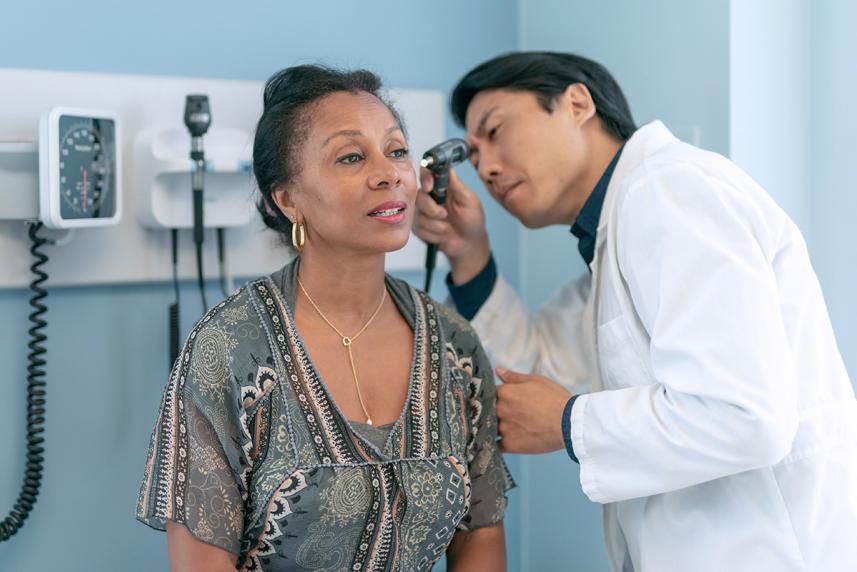Meet the providers on your hearing health team
You may get care from several specialists if you have hearing loss. Find out about the experts who have your back.

Your ability to hear is one key part of your overall well-being. And as you reach your 50s and 60s, it may be time to have your hearing checked. That’s when many people begin to notice age-related hearing loss.1
Treating problems early is important, since hearing loss may increase the odds of memory issues, depression and falls.2 It also affects your quality of life. After all, it helps to have a pair of sharp ears to understand conversations, be on the alert for ambulance sirens, or enjoy a show or music.
Many people don’t notice they’re losing their hearing right away. “Hearing gradually decreases over a number of years,” says Victoria Laurella, Au.D. She’s an audiologist at ENT and Allergy Associates in Staten Island, New York. “So over time it becomes your new normal and then you realize, ‘Maybe I can hear people talking but I can’t understand exactly what they’re saying.’”
That’s why it’s vital to find providers who can help you diagnose and treat the problem. Too often though, people with hearing loss wait roughly 10 years before they seek help.2 Sometimes the challenge is cost. Other times, it’s just knowing which provider to see first.
Here are the four types of providers who might be part of a hearing care team, and who may help you find a solution to your hearing issues.

Changes in hearing can be subtle at first. Find out if hearing loss may be interfering with your life.
1. Primary care provider (PCP)
Your PCP is a great first stop for hearing-related questions.3 Many patients mention hearing issues during their annual visit, notes Laurella.
Your doctor will use a tool called an otoscope to look into your ear canal and eardrum. They will look for physical problems that could affect your hearing, such as:4
- Excess earwax
- Fluid
- Swelling
Swelling and fluid buildup could signal an ear infection.5 Treating it will likely improve your hearing loss. The same goes for earwax buildup. Removing earwax should lead to improved hearing.4
Your PCP will also give you a basic hearing screening. This checks to see if you have normal hearing.1 If you fail the test, your provider might recommend that you see a hearing care professional for an in-depth test. This could be an audiologist or a hearing instrument specialist. Both can give you a hearing test and fit you with hearing aids.
Depending on your symptoms, your PCP may also refer you to an ear, nose and throat doctor (ENT). ENTs and audiologists often work closely together.6
2. Audiologist
Your primary care provider may refer you to an audiologist for a complete hearing test. This is especially true if the PCP suspects you need hearing aids.
These hearing care professionals aren’t M.D.s, but they have specialized degrees to help with hearing and balance issues.7 “Audiologists test your hearing, diagnose the loss, and then recommend treatment from there,” Laurella says.
Some common test done by an audiologist include:1
- Pure tone audiograms. This test measures your ability to hear soft sounds and different tones.
- Speech testing. This test measures how well you can understand speech, with or without background noise.
- Tympanometry. This test measures how well your eardrum works.
The first line of treatment is often hearing aids. An audiologist can fit you with the right hearing aid, program it and schedule follow-up visits to make sure you’re not having issues.8
An audiologist may also recommend additional devices to help you hear better around the home. These include amplified telephones, closed-captioning on the TV, and FM sound systems that stream sound to hearing aids so that you’re less likely to hear background noise.9
If any issues with the devices come up, or you need advice on managing your hearing loss, an audiologist can help.
Did you know that many hearing benefits, including a hearing exam and consultation, are covered through UnitedHealthcare Hearing? Learn more.
3. Hearing instrument specialist
You might also be sent to a hearing instrument specialist. These hearing care professionals are similar to audiologists. Also known as hearing aid specialists or hearing aid dispensers, they’re state-licensed professionals trained to fit and program hearing aids.
Like audiologists, they also administer hearing tests.3,7 And they’re covered by most hearing plans, so you can go to a hearing instrument specialist instead of an audiologist to get hearing aids.
While they can’t diagnose hearing loss, they’re trained to recognize various types of hearing loss. So they can also answer any questions you might have about your particular issue.3
4. Ear, nose and throat doctor (ENT)
An ENT is a medical doctor who diagnoses, treats and manages diseases of the ear, nose, throat, head and neck. ENTs also perform surgical procedures.
Sometimes your primary care provider will send you to an ENT first. Other times, an audiologist might suggest you see one first to rule out other causes of hearing loss. “The ENT will check if there’s any wax in the ears, which sometimes is a big factor in hearing issues, or if they have any related diseases or ear infections,” Laurella says.
Some of these conditions may include Ménière’s disease, an inner ear problem that causes dizziness and ringing in the ear. Others include acoustic neuroma (a tumor) and traumatic brain injuries.10 ENTs also diagnose and treat ear injuries that can affect hearing, such as a ruptured eardrum.
While they don’t prescribe or fit hearing aids, an ENT can recommend and perform other types of specialized treatments. That may include medications or even surgery to implant devices to restore normal hearing.4
How to find a hearing care professional
If you need help with hearing loss, your PCP can refer you to a hearing care professional for a complete hearing evaluation. UnitedHealthcare Hearing members can also get a hearing exam and consultation without a referral.
Just act sooner rather than later if you notice you’re having trouble following what people say, at home or at work. That way, you’ll get treated no matter what the issue — and go back to hearing things crisply again.
Sources
- Hearing test Cleveland Clinic. Last reviewed August 30, 2022.
- Hearing loss is more common than diabetes. Why aren’t we addressing it? National Council on Aging. Published September 15, 2023.
- Who can I turn to for help with my hearing loss? National Institute on Deafness and Other Communication Disorders. Last updated July 5, 2022.
- Hearing loss Cleveland Clinic. Last reviewed August 24, 2023.
- Ear infection — acute National Library of Medicine: MedlinePlus. Last reviewed January 24, 2023.
- Age-related hearing loss (presbycusis) National Institute on Deafness and Other Communication Disorders. Last updated March 17, 2023.
- Audiologists vs. hearing instrument specialist vs. ENTs American Academy of Audiology. Accessed December 20, 2023.
- Hearing aids National Institute on Deafness and Other Communication Disorders. Last updated October 11, 2022.
- Assistive listening and alerting devices American Academy of Audiology. Accessed December 20, 2023.
- Causes of hearing loss in adults American Speech-Language-Hearing Association. Accessed December 20, 2023.
Information is for educational purposes only and is not a substitute for the advice of a licensed medical provider. Consult your provider prior to making changes to your lifestyle or health care routine.


